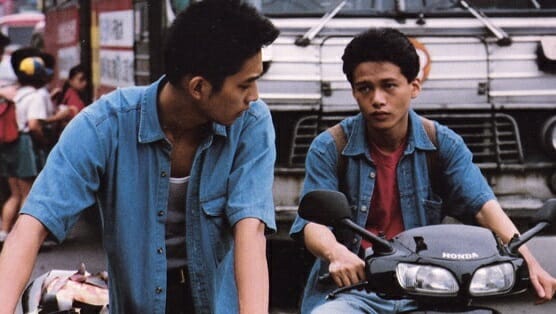
If Tsai Ming-liang hadn’t beaten Nicolas Winding Refn’s career to the punch by several years, Rebels of the Neon God would have been a killer moniker for one of the great Dane’s as-yet-unimagined future projects. Even in that alternate timeline, though, Tsai’s debut feature comes from such a culturally specific place that only he could have conceived it. (The film premiered in 1992, but has only just managed to secure a U.S. release more than two decades after the fact.) The title refers to Nezha, an impulsive, rash child deity of classical Chinese mythological origins. For Tsai’s purposes, though, that name reflects just as keenly on the first of his film’s dueling protagonists, Hsiao-kang (Lee Kang-sheng), who represents one side of a coin Tsai sets pirouetting above the endless, thrumming streets of Taipei.
Hsiao-kang is a cram student who lives most of his life between the confines of his parents’ apartment and his school. He’s a quiet, well-behaved kid, or at least he gives the impression of being well-behaved; Tsai takes his time revealing the character’s eccentricities, so best not let looks fool you. (His mother thinks he’s Nezha reincarnated. That alone speaks volumes about his upbringing.) Hsiao-kang strikes a sharp contrast to the movie’s second lead, Ah-tze (Chen Chao-jung), who spends his days sleeping in his brother’s flooded, decrepit apartment and his evenings robbing payphones and blowing the proceeds playing arcade games with his chum Ah-bing (Jen Chang-bin).
Rebels of the Neon God establishes the distance that separates Hsiao-kang’s world from Ah-tze’s within its opening frames. The former struggles to study in his room while the latter commits petty theft and plays Street Fighter II. But while Tsai introduces us to Hsiao-kang and Ah-tze straight away, he takes considerably longer acquainting them with each other. When he does, it’s in a fleeting moment when an impetuous Ah-tze destroys the side-view mirror on the taxi Hsiao-kang’s dad drives. Hsiao-kang spends the rest of the film unraveling; he stalks Ah-tze, shadowing him at arcades and in food courts, where he canoodles with his crush, Ah-kuei (Wang Yu-wen). It’s unclear whether Hsiao-kang is out for retribution or, perhaps, a chance connection. Hsiao-kang resents Ah-tze as much as he wants to be just like him, and why not? Ah-tze lives by his own rules, unshackled by the expectations of others. (There’s a reason Tsai periodically invokes the specter of James Dean.) He isn’t burdened by yearning, as Hsiao-kang is.
Tsai’s film is steeped in sweaty ennui. Somehow he’s managed to capture the humid closeness of city dwelling on celluloid. Taipei’s glowing urban tapestry figures as heavily into Rebels of the Neon God’s loosely woven plot as Hsiao-kang’s beef with Ah-tze. This is very much a “city” movie, one that distills the experiential qualities of walking down a crowded street into the simple act of viewing. Treat it like a travel guide. Taipei, in all its noisome electric glory, may well be the film’s eponymous “neon god” and not Nezha. If so, the city is a passive creator, content to merely observe its servants’ fruitless, unspoken squabbles. Ah-tze doesn’t know who Hsiao-kang is, much less that Hsiao-kang is habitually following him. In a metropolis like Taipei, you’d expect these two would have a harder time incidentally encountering one another. That, however, may be the film’s ultimate tragedy: Tsai’s lens narrows Taipei’s scope, but Hsiao-kang’s timidity ensures that he and Ah-tze remain strangers.
For both Tsai devotees and the uninitiated, Rebels of the Neon God is an embarrassment of riches that demands immediate attention. The film offers a backwards glance at the filmmaker’s craft in its adolescence. Hints and signs of the technical master he has become over time abound in scene after scene, particularly in his use of extended static shots, his dry humor, and his casting choices. (Lee has starred in all of Tsai’s films to date, while Chen, Wang and supporting cast members Lu Yi-ching and the late Tien Miao, playing Hsiao-kang’s parents, have each appeared in a handful of the director’s subsequent efforts.) But though Rebels of the Neon God shows Tsai as a budding artist, it’s no less impressive in its confidence and poetic clarity.
Director: Tsai Ming-liang
Writer: Tsai Ming-liang
Starring: Lee Kang-sheng, Chen Chao-jung, Jen Chang-bin, Wang Yu-wen, Lu Yi-ching, Tien Miao
Release Date: April 10, 2015
Boston-based critic Andy Crump has been writing about film for the web since 2009, and has been scribbling for Paste Magazine since 2013. He also contributes to Screen Rant, Movie Mezzanine and Badass Digest. You can follow him on Twitter. Currently he has given up on shaving.